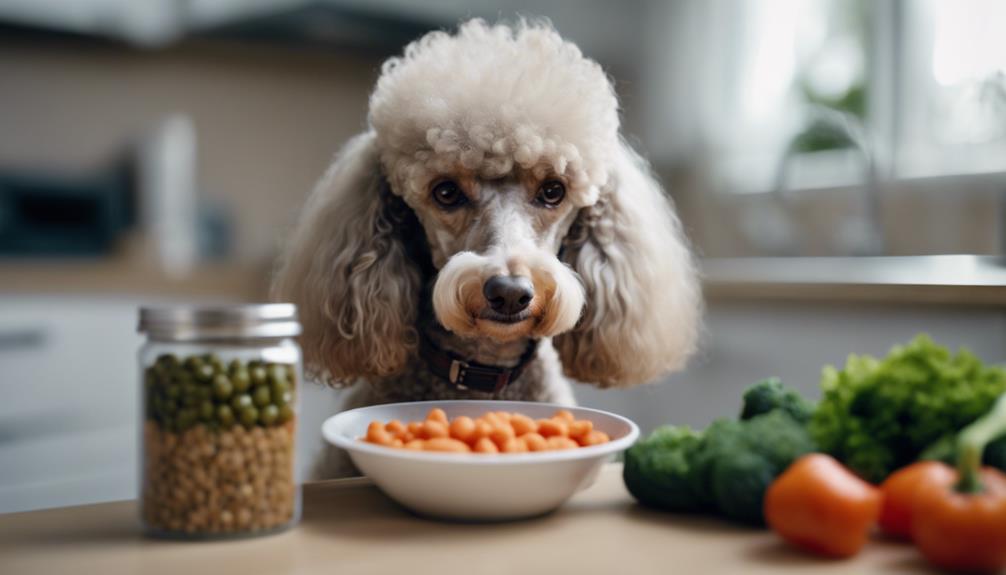Are you aware of the subtle dietary changes necessary to support your senior Poodle's health and vitality? As your loyal companion ages, have you considered how to adjust their diet effectively for their golden years? Let's explore essential diet adjustments and tips tailored to meet the specific needs of your aging Poodle, ensuring their well-being and happiness in their later stages of life.
Key Takeaways
- Tailor diet for senior Poodles to address age-related nutritional needs.
- Provide high-quality food focusing on bone strength and joint health.
- Manage weight with adjusted portions and regular checks.
- Enhance health with vet consultations, supplements, and dental care.
Importance of Tailored Senior Diet
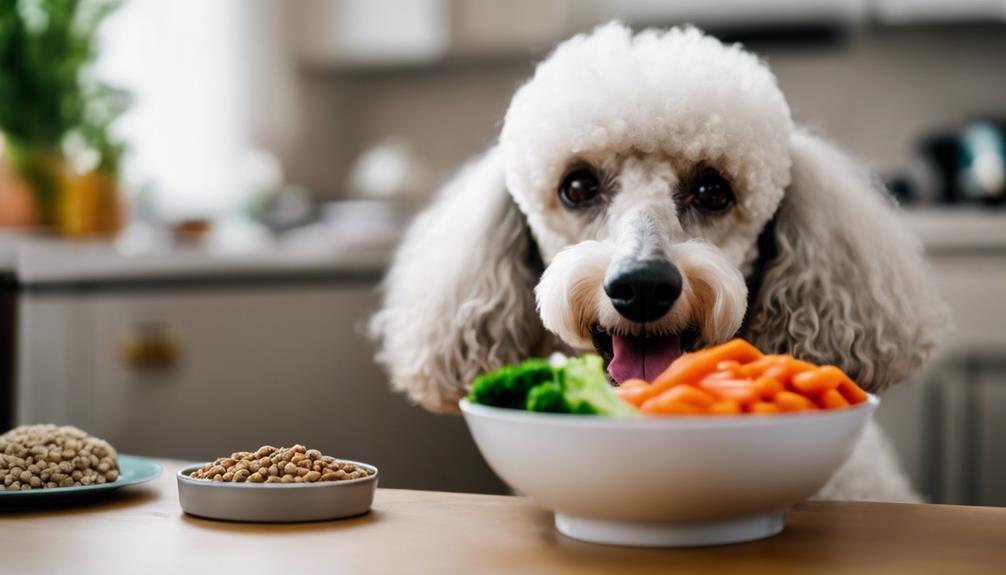
Tailoring a senior Poodle's diet is essential to meet their specific nutritional requirements as they age. As your furry companion grows older, their dietary needs change, requiring a diet rich in age-related nutrients to support their health and well-being. Neglecting to address these specific needs can lead to health issues such as osteoarthritis and a decline in their quality of life. By providing a diet tailored to your senior Poodle's age and health status, you are ensuring they receive the necessary nutrients to thrive in their later years.
Understanding the importance of a properly tailored senior Poodle diet is key to promoting their overall health and vitality. By incorporating age-related nutrients into their meals, you can help prevent potential health concerns and enhance the quality of life for your beloved companion. Remember, adjusting their diet as they age is a simple yet powerful way to show your care and dedication to their well-being.
Nutritional Needs of Aging Poodles
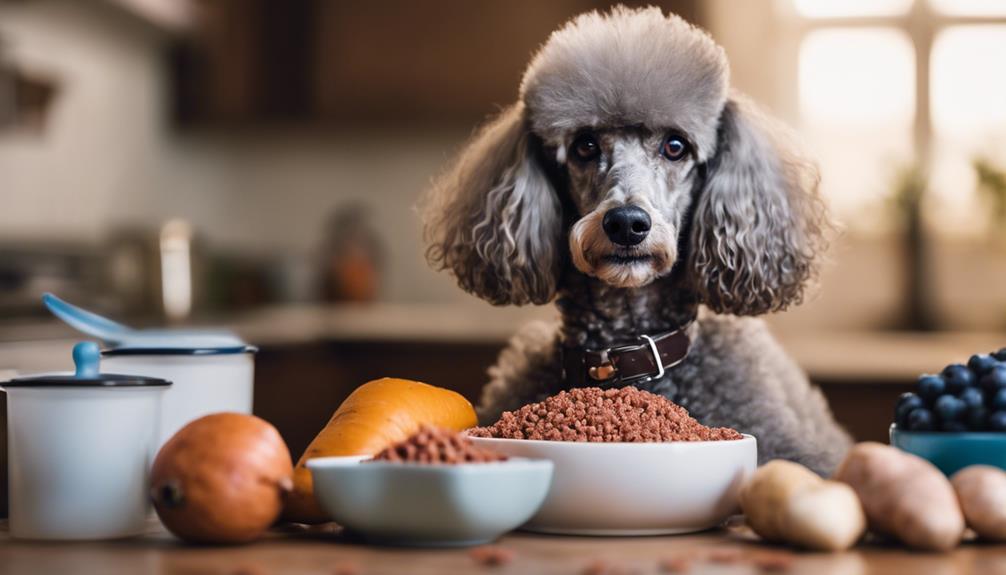
As aging Poodles mature, their nutritional requirements evolve to support their changing health needs. It's essential to provide senior Poodles with diets that cater to their specific dietary needs as they age. By focusing on the right nutrients, you can help promote their bone strength, joint health, organ function, and dental well-being. Neglecting these nutritional needs can put senior Poodles at risk of developing health issues like osteoarthritis, which can greatly impact their quality of life. To ensure your aging Poodle receives the best possible nutrition, consulting with a veterinarian is highly recommended. Veterinarians can offer valuable insights into tailoring a diet plan that addresses the unique nutritional requirements of senior Poodles, promoting their overall health and vitality.
| Nutrient | Importance |
|---|---|
| Protein | Supports muscle strength |
| Omega-3 fatty acids | Promotes joint health |
| Antioxidants | Boosts immune system |
| Glucosamine | Aids in joint function |
Adjusting Portion Sizes for Seniors
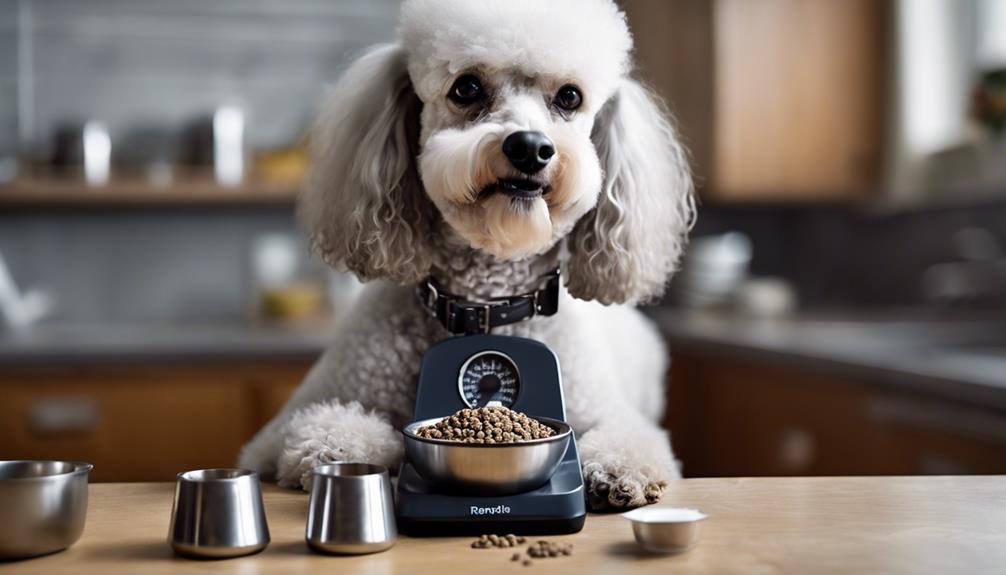
Adjusting portion sizes for senior Poodles involves carefully considering their activity level and weight management needs to ensure optimal health and well-being. As Poodles age, their metabolism and activity levels may change, affecting the amount of food they require. Senior Poodles generally need fewer calories to prevent obesity and maintain a healthy weight. It's essential to monitor their portion sizes closely to avoid overfeeding, which can lead to health issues.
To determine the right portion sizes for your senior Poodle, consult with a veterinarian. They can provide personalized recommendations based on your dog's specific needs, including any health conditions or dietary restrictions. By adjusting portion sizes according to your senior Poodle's activity level and weight management requirements, you can help them stay healthy and active in their later years. Remember, proper portion control is key to ensuring your senior Poodle receives the appropriate nutrition without excess calories that could impact their well-being.
Senior Poodle Food Quality Standards
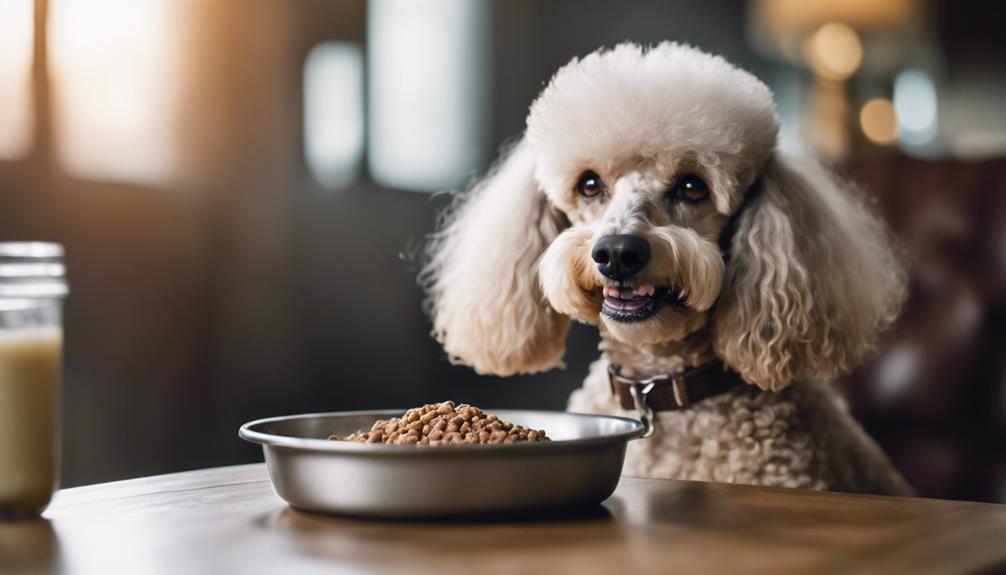
When choosing senior dog food for your Poodle, prioritize high-quality proteins like real meat to support muscle mass maintenance. Look for senior dog foods that contain essential fats such as Omega-3 and Omega-6, which provide energy and promote a healthy coat. Opt for options with complex carbohydrates like sweet potatoes and brown rice to ensure your senior Poodle has sustained energy throughout the day. It's crucial to choose senior dog foods that are rich in proteins, moderate in fats, and free from fillers like corn or wheat to maintain optimal health in your furry companion. Tailored nutrition is key, so match the senior dog food to your Poodle's specific age, size, activity level, and health requirements for a well-rounded diet. By focusing on these quality standards in senior Poodle food, you can help your beloved pet age gracefully and stay healthy for years to come.
Monitoring Weight and Body Condition
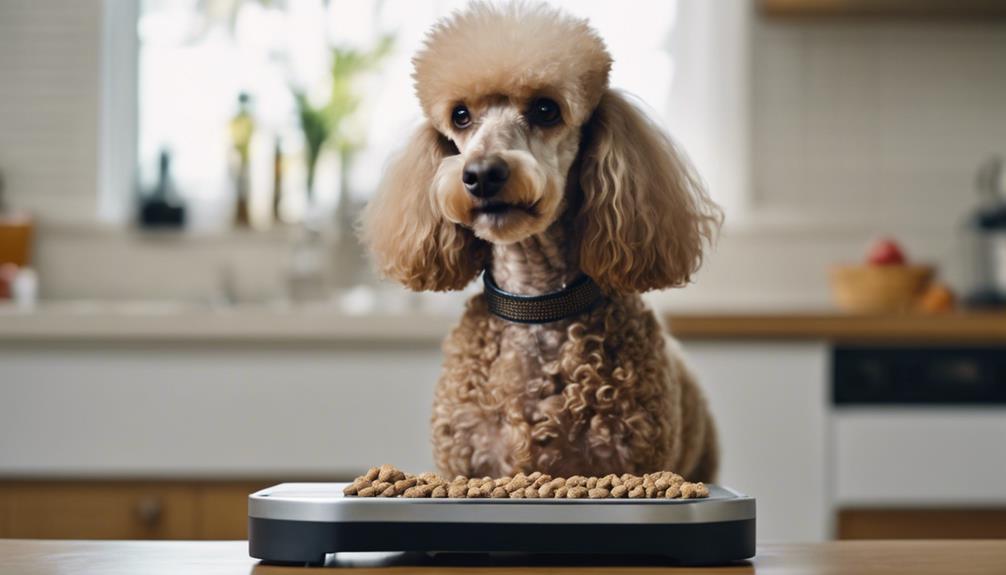
Regularly monitoring your senior Poodle's weight and body condition is crucial for their well-being. By using body condition scoring techniques, you can assess if your Poodle is at a healthy weight. Adjust their diet accordingly to maintain their optimal body condition and prevent any potential health issues.
Weight Monitoring Importance
Monitoring the weight and body condition of your senior Poodle is essential for maintaining their health and well-being as they age. Regular weight checks play a vital role in preventing obesity and ensuring your Poodle stays in good health. By monitoring their weight, you can track any fluctuations that may indicate underlying health issues. Maintaining an ideal weight is key to reducing the risk of joint problems, heart issues, and other complications commonly seen in senior Poodles. It also allows you to make timely adjustments to their diet and exercise routines to support their overall well-being. Remember, consulting with your veterinarian can provide valuable guidance on setting appropriate weight goals and strategies to manage your senior Poodle's weight effectively.
Body Condition Assessment Techniques
To assess your senior Poodle's body condition accurately, utilize the body condition score chart and visually check for any noticeable weight changes. Regularly weigh your Poodle and compare the results to track any fluctuations. Pay attention to visible signs such as the visibility of ribs or hip bones, as these can indicate weight loss or gain. If you notice significant changes in your Poodle's body condition, consult your vet promptly. Your vet can provide guidance on how to adjust your Poodle's diet and exercise routine based on these assessments. By staying vigilant and proactive in monitoring your senior Poodle's body condition, you can ensure they maintain a healthy weight and overall well-being.
Essential Nutrients for Senior Poodles
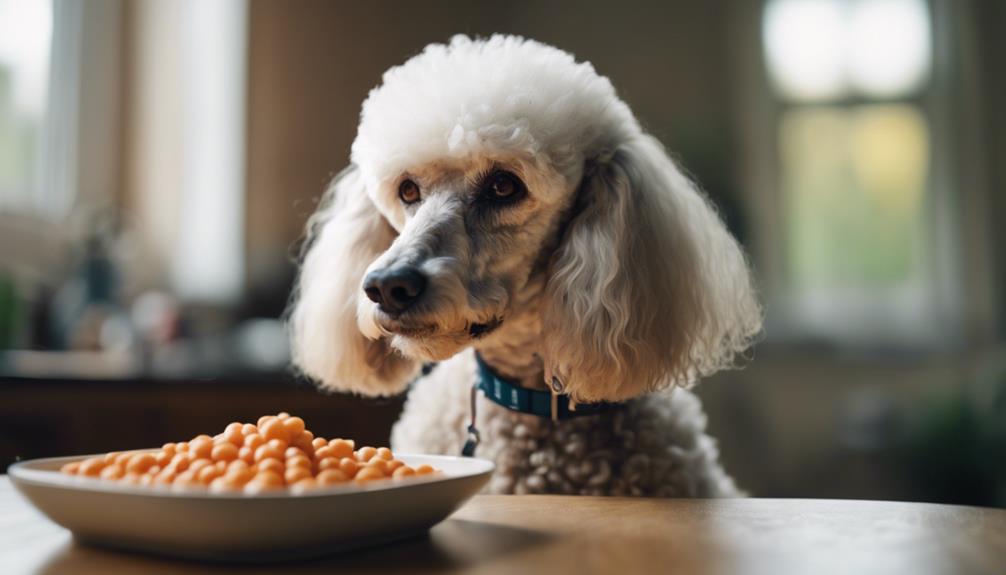
For optimal health in senior Poodles, ensuring they receive specific age-related nutrients like joint supplements is crucial. Essential fats, including Omega-3 fatty acids, play a vital role in providing energy and maintaining a healthy coat for your aging Poodle. Additionally, maintaining proper fiber intake is essential for promoting bowel regularity in senior Poodles, aiding in digestion and overall gut health. Adjusting protein levels in their diet based on weight changes and any existing health conditions is important to support their nutritional needs as they age gracefully. It's recommended to consult with your vet to determine the appropriate caloric intake for your senior Poodle and consider adding antioxidants to their diet to help combat aging effects. Here is a table summarizing the essential nutrients for your senior Poodle:
| Nutrient | Importance | Food Sources |
|---|---|---|
| Joint Supplements | Supports joint health and mobility | Glucosamine, Chondroitin |
| Essential Fats | Provides energy and maintains a healthy coat | Fish oil, Flaxseed, Canola oil |
| Fiber Intake | Promotes bowel regularity and gut health | Pumpkin, Sweet potatoes, Oatmeal |
| Protein Levels | Adjusted based on weight and health needs | Chicken, Turkey, Salmon |
Special Considerations for Senior Poodles
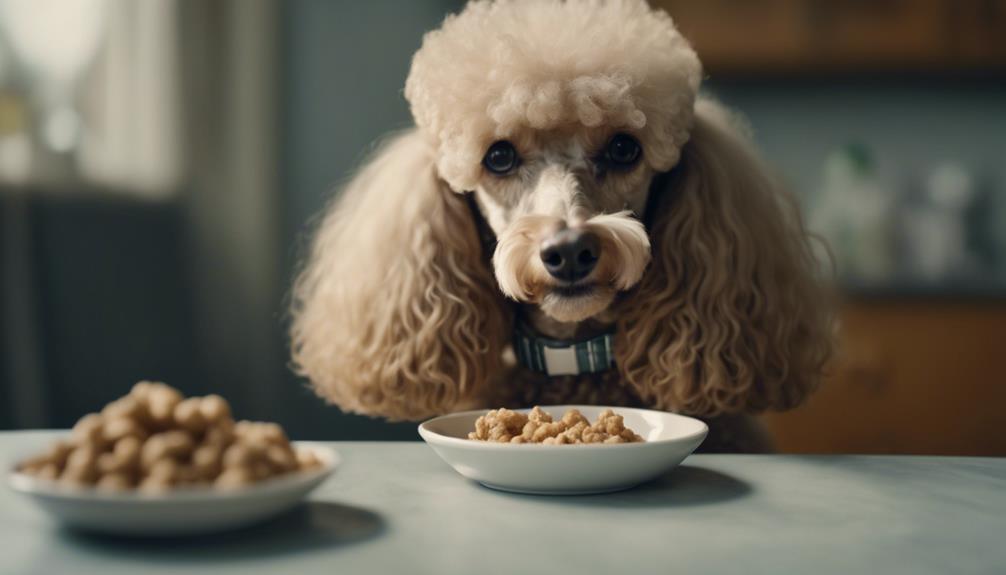
As your senior Poodle ages, it's important to consider special dietary considerations to support their changing nutritional needs and overall well-being. When caring for your aging furry friend, keep in mind the following:
- Consult Your Veterinarian: Your senior dog's nutritional needs may vary, so consulting with a veterinarian is crucial in determining the best diet plan for your Poodle.
- Quality Ingredients Matter: Opt for senior dog food that contains high-quality ingredients to ensure your aging Poodle receives essential nutrients for maintaining health and vitality.
- Adjust Diet as Needed: Be prepared to make diet adjustments as your senior Poodle ages to address specific health issues like osteoarthritis and to cater to any changing needs they may have.
Tips for Enhancing Senior Poodle Health
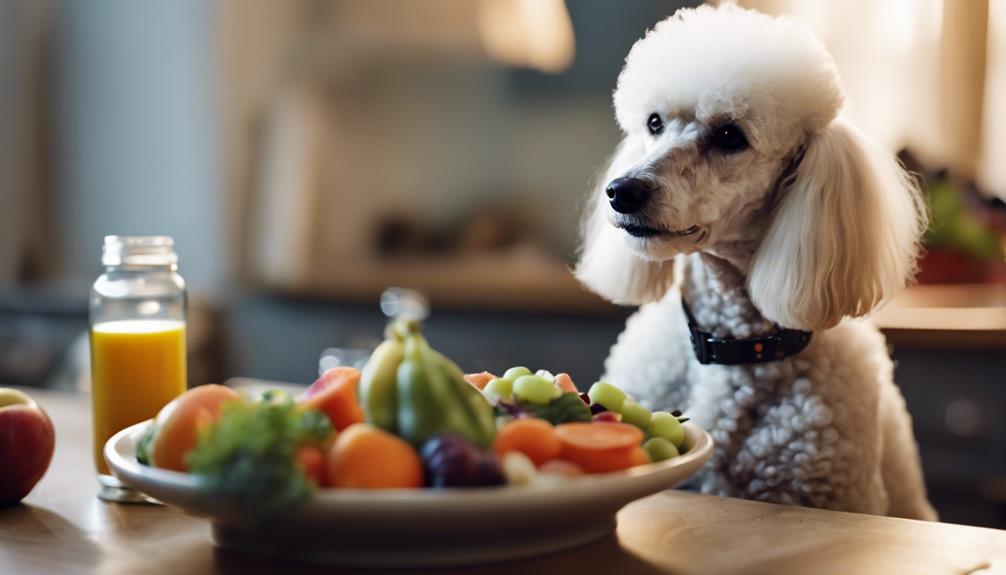
As you care for your senior Poodle, remember that regular veterinary check-ups are crucial for tailoring their diet to their specific health needs. Providing high-quality, age-appropriate food is essential in enhancing your aging Poodle's overall health. Adjusting portion sizes, incorporating joint supplements, and ensuring proper hydration are key steps in supporting your senior Poodle's well-being.
Exercise for Mobility
To maintain your senior Poodle's mobility and joint health, incorporating regular exercise into their routine is essential. Here are some key tips to keep your furry companion active and healthy:
- Engage in Low-Impact Activities: Opt for gentle exercises like short walks or swimming to prevent muscle loss and stiffness in aging Poodles.
- Tailor Exercise Routines: Customize workouts to suit your senior Poodle's needs, focusing on improving balance and coordination.
- Consult a Veterinarian: Seek professional advice to create a personalized exercise plan that considers your dog's overall health status.
Dental Care Importance
Maintaining proper dental care for your senior Poodle is crucial for their overall health and well-being, especially as dental disease can impact their appetite and quality of life significantly. Dental health plays a vital role in the overall wellness of older dogs. To ensure your senior Poodle's oral health, regular dental care is essential. Keep an eye out for signs of dental issues such as difficulty eating or bad breath, and consult your veterinarian promptly if you notice any concerns. By prioritizing dental hygiene, you can prevent oral health problems and contribute to your senior Poodle's comfort and happiness. Remember, a healthy mouth leads to a healthier and happier senior Poodle.
Regular Vet Check-Ups
Regular vet check-ups play a vital role in enhancing the health of your senior Poodle by monitoring any changes and addressing emerging issues proactively. During these check-ups, here's what you can expect:
- Tailored Diet Recommendations: Veterinarians provide specific dietary advice to ensure your senior Poodle receives optimal nutrition.
- Early Detection of Health Issues: Health assessments help catch age-related conditions early for timely interventions.
- Personalized Care Plans: Vet consultations enable the creation of tailored care plans to maintain your senior Poodle's well-being. Regular check-ups allow for adjustments to the diet based on changing nutritional needs and health requirements, promoting longevity and overall health.
Potential Risks of Inadequate Diet
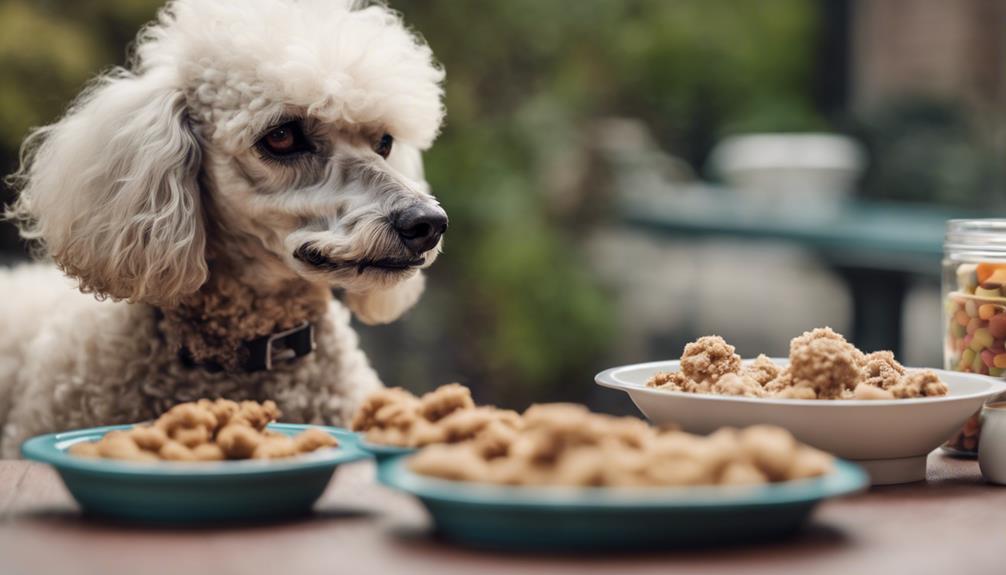
Neglecting the dietary needs of your senior Poodle can result in serious or even fatal health consequences. Providing appropriate senior dog food is crucial for maintaining weight management, joint health, mental well-being, and overall quality of life. Aging dogs have specific nutritional requirements that, if not met, can lead to various health issues. Inadequate diet choices may cause your Poodle to struggle with weight management, increasing the risk of obesity and related conditions. Furthermore, a lack of proper senior dog food can contribute to joint problems, impacting your pet's mobility and comfort. Poor nutrition can also affect your Poodle's mental health, potentially leading to anxiety, cognitive decline, and other behavioral issues. By ensuring your senior Poodle receives the necessary nutrients through a balanced diet, you can significantly enhance their quality of life and promote longevity. Remember, the food you provide plays a crucial role in your furry companion's overall well-being.
Dental Health and Diet Connection
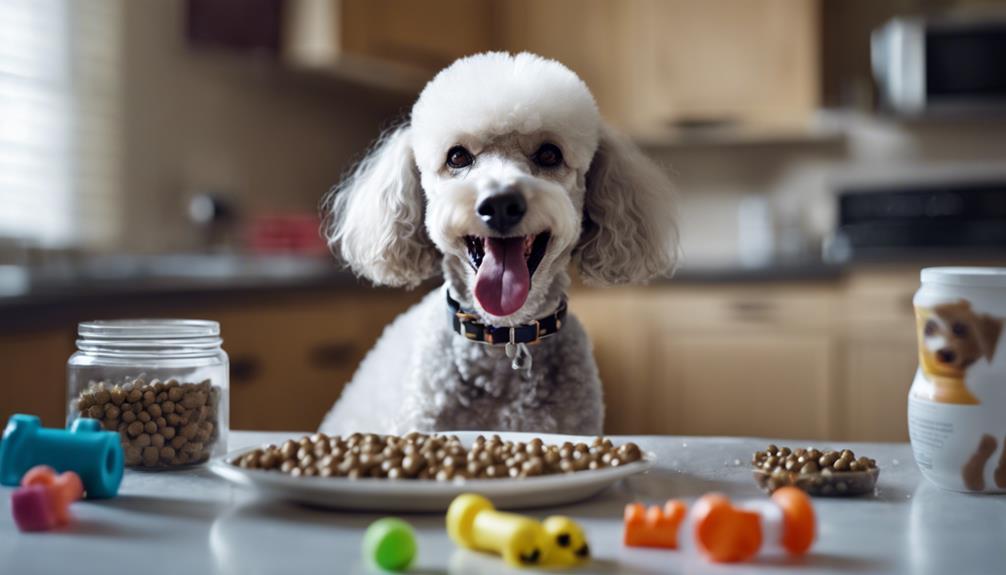
To ensure your senior Poodle's overall well-being and longevity, understanding the crucial link between dental health and diet is essential. Here are some key points to consider:
- Dental Disease Impact: Dental disease in senior Poodles can lead to tooth pain, affecting their appetite and overall well-being.
- Proper Dental Care: Proper dental care, including regular check-ups and teeth cleaning, is crucial for enhancing the lives of older dogs.
- Consult a Veterinarian: If your senior Poodle stops eating, consult a veterinarian as dental issues could be a possible cause.
Dental health is closely intertwined with diet, underscoring the importance of providing appropriate foods that support oral health for senior Poodles. By incorporating good dental hygiene practices and suitable dietary choices, you can help prevent dental problems in your senior furry companion and contribute significantly to their overall quality of life. Remember, a healthy mouth leads to a healthier and happier senior Poodle.
Choosing the Right Senior Dog Food
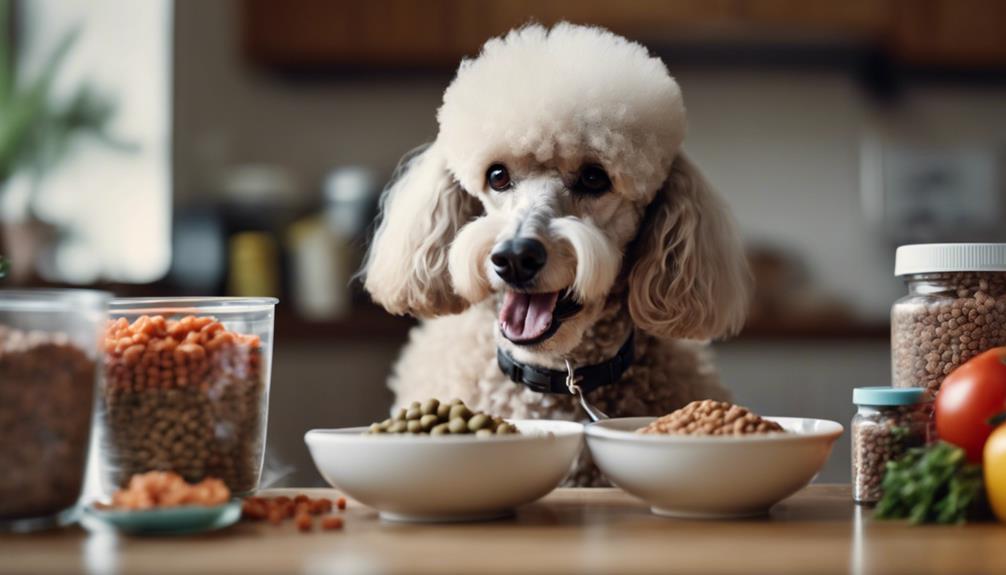
When selecting the appropriate senior dog food for your aging Poodle, it's crucial to consider factors such as their size, age, and overall health to ensure they receive the tailored nutrition they need. Tailoring a diet plan to meet the personalized nutritional requirements of your senior Poodle is essential. Remember, popular or expensive dog food brands do not always guarantee the proper nutrition needed for senior dogs. Adjusting key nutrients like protein and Omega fatty acids is crucial for the health and well-being of senior Poodles. Consulting a vet or seeking online consultations can help determine the best diet for your senior Poodle. These professionals can offer guidance on selecting a senior dog food that aligns with your Poodle's specific needs, ensuring they receive the proper balance of nutrients to support their aging bodies. By prioritizing their nutritional requirements through the right senior dog food, you can contribute significantly to your Poodle's overall health and quality of life.
Implementing Diet Changes Safely
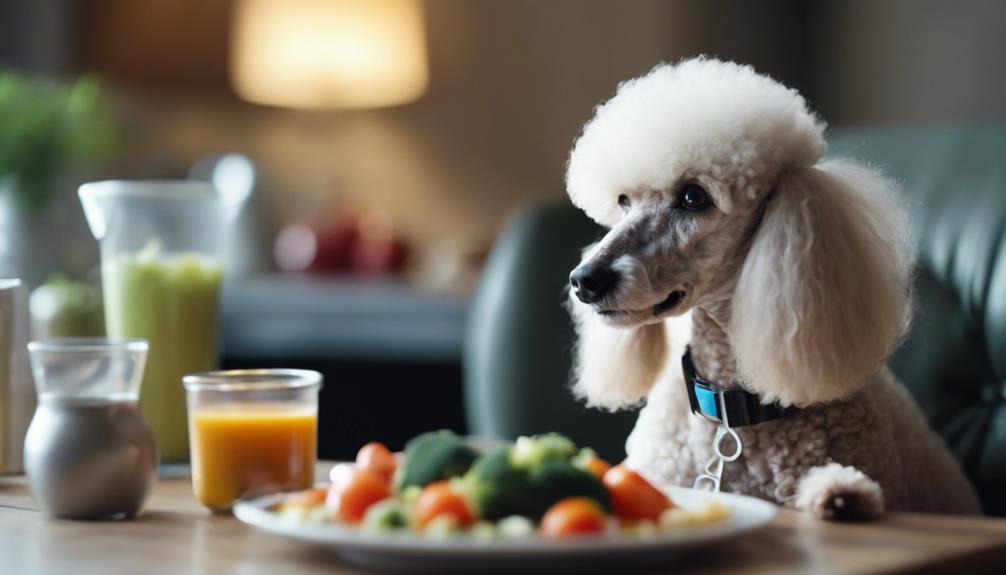
When transitioning your senior Poodle to a new diet, take it slow over 7-10 days to prevent tummy troubles. Watch for any signs of discomfort or allergies during this adjustment period. Always consult with your vet before making significant dietary changes to ensure your Poodle's well-being.
Gradual Dietary Transitions
For a smooth transition to your senior Poodle's new diet, gradually introducing the new food while monitoring their reaction is key to preventing digestive upset.
Tips for Gradual Dietary Transitions:
- Mix the new food with the old food in increasing proportions over 7-10 days.
- Observe your Poodle's response closely during this transition period.
- This gradual approach minimizes the risk of gastrointestinal issues and helps your senior Poodle adjust comfortably to the new diet.
Monitor for Adverse Reactions
To ensure a safe transition to a new diet for your senior Poodle, monitor closely for any adverse reactions such as digestive upset, vomiting, diarrhea, or changes in behavior. It's essential to observe how your Poodle responds to the dietary changes to address any issues promptly. Keep an eye out for allergic reactions like itching, rashes, or excessive licking, as these could indicate a negative response to the new food. If you notice persistent negative reactions or concerning symptoms, consult your veterinarian for guidance. Remember to gradually introduce the new food over 7-10 days to minimize gastrointestinal disturbances and help your Poodle adjust comfortably. Your attentiveness and care during this period are crucial for your senior Poodle's health and well-being.
Frequently Asked Questions
What Is the Best Feeding Schedule for Senior Dogs?
For senior dogs, feeding twice a day is best. It helps manage hunger, maintain energy, prevent bloat, aid digestion, and monitor health. Slowly transition to new food over 7-10 days to avoid tummy troubles.
What Not to Feed a Senior Dog?
You absolutely must steer clear of toxic foods, harmful ingredients, dangerous treats, unsafe snacks, and risky supplements when feeding your senior Poodle. Keep these out of reach to safeguard your furry friend's health.
How Should a Dog's Diet Change When They Become a Senior?
As your dog ages, adjust their diet with higher protein for muscle maintenance, fewer calories to prevent weight gain, increased fiber for digestion, joint supplements for mobility, and softer/wet food for dental care and easier chewing.
What Is the Best Diet for a Poodle?
For your Poodle's best diet, focus on weight management, meet their nutritional requirements with real meat proteins, support digestive health with quality carbohydrates, and consider dental care. Prioritize their well-being with these choices.
Conclusion
As you nourish your senior Poodle, remember that each meal is a love letter to their health and happiness. Just like a well-tended garden blooms with care, your furry companion thrives on the nutrients you provide. By feeding them well, you are nurturing not just their body, but their spirit too. So keep their bowl full of goodness, and watch them blossom in their golden years. Your Poodle will thank you with every wag of their tail.
